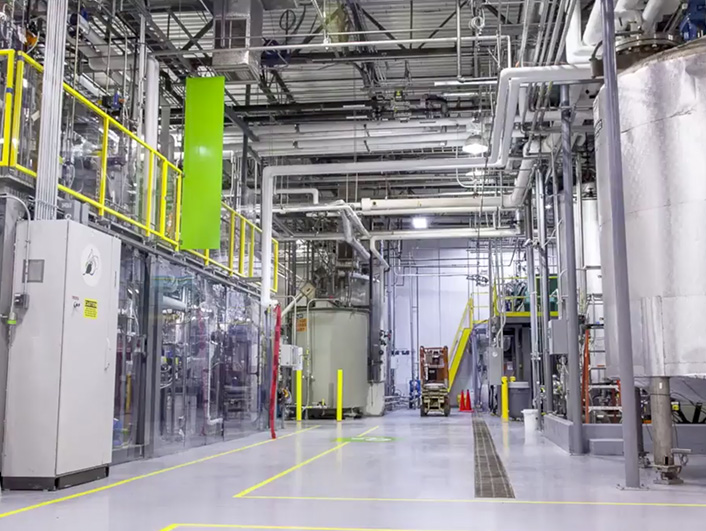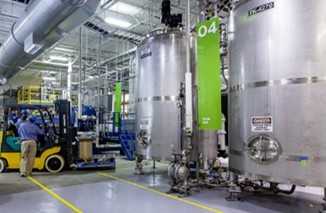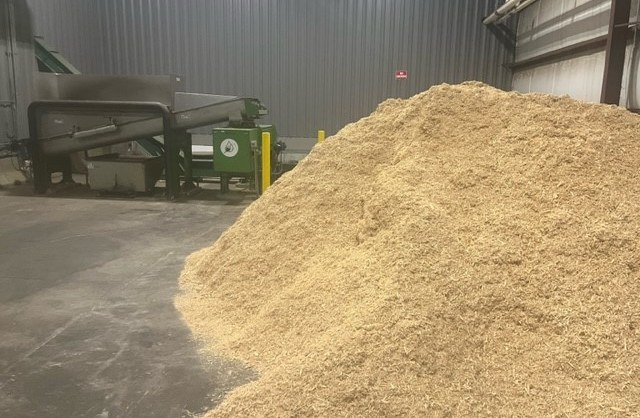Process Technology Solution to Materials Decarbonization
We unlock the building blocks created by nature. We transform biomass into new and unique materials that have immense functionality in a variety of markets and applications. These materials enable the production of sustainable aviation fuel (SAF) and lower carbon, renewable materials for uses such as foams and adhesives. We are the upstream answer using forest residues to meet our growing need for more bio-content performance materials. We are now sharing commercial quantities of our materials innovation with the world.


What We Do
Our platform Plantrose®️ technology is the key to releasing unique materials from plants.
We upcycle biomass needed for a renewable world. These biomass products have new performance advantages and are cost competitive with higher-emitting CO2 fossil fuel products. That’s why the Plantrose platform is an incredible breakthrough. Only using water, we transform the biomass into new and unique materials that have immense functionality. And we do it today with cellulosic sugars for fermentation pathways and high purity lignin for natural polyol and sustainable development pathways.

Enabling Sustainable Aviation Fuel
We are a leader in upcycling biomass to enable ethanol-to-jet-fuel routes on a large scale with favorable economics.
The world is demanding Sustainable Aviation Fuel (SAF) for its earth-friendly renewable sourcing and to accelerate decarbonization globally. There is a massive gap between SAF used today (near 0) and US targets for both 2030 (3 billion gallons) and 2050 (35 billion gallons). For the U.S., using de-risked forest residue supply chains will make the greatest scale impact on SAF – up to 1/3 of the target 2050 needs (per USDA 1 Billion Ton Study). Plantrose is the only technology proven to efficiently break down forestry residues (woody biomass) on a commercial scale to enable SAF in cellulosic (2nd generation) sugar to ethanol to jet fuel pathways.
Decarbonization
Our Natural Polyols can have a meaningful impact on decarbonization and are being used today.
In a world looking to reduce CO2 emissions from product manufacturing, there are some industries that we cannot live without that also pose hard to solve carbon emissions problems. These include aviation fuel, construction materials, chemicals, and materials used in an array of common products like batteries and adhesives. The Plantrose process turns renewable biomass into materials that can be used to drive decarbonization, replace fossil fuel-derived materials, and mitigate climate change in these hard-to-abate industries. For example, our Omno® natural polyols extracted from biomass can be used in a variety of chemical processes including foams, plastics, and adhesives. Our Omno lignin products can be used to lightweight building materials and satisfy their lower emission product targets.



Biorefinery
Biorefineries are the logical evolution of refining renewable feedstock, and present a winning opportunity to build such natural production capacity in the future. A biorefinery would take in woody biomass and churn out fermentable sugars to create SAF, as well as (for example) natural polyols for chemical applications and lignin for batteries and construction materials. We operate two facilities today, one in Rome, New York and one in Kennesaw, Georgia, producing our Omno grades and sugar materials. As we finalize customer offtake demand, we intend to then build a larger commercial biorefinery making the Plantrose products for our customers and partners. Renmatix envisions licensing its technology for the construction of future biorefineries, allowing for proliferation of this powerful Plantrose technology to drive decarbonization and sustainable industrial practices, all with attractive returns on investment.
Why It Matters
Responsible use and care of Mother Nature’s bounty is in the DNA of our technology and company culture.
Mother Nature makes the biomass rich with an abundance of cellulose and lignin in the cell wall structure. Plantrose was born with the intent to provide valuable materials for many applications while protecting the well being of our environment, the people, and all creatures. We can serve the markets, upcycle waste streams, bring technology to rural communities, and protect our planet. The time is now for decarbonization of hard-to-abate industries like aviation fuel, cement, batteries, plastics and more. The time is now for Plantrose.

Curious to Learn More?
Why Choose Renmatix
Plantrose Materials are powerful, versatile, and unique
We create powerful, versatile and unique materials using the Plantrose technology. And we can do it using sustainably sourced, renewable biomass – in a cost competitive manner at commercial scale. These materials include fermentable cellulosic sugars, lignin, natural polyols, cellulose, microcrystalline cellulose, nanocrystalline cellulose, Type I cellulose, Type II cellulose, small and long chain oligomers, plant-based fiber, soluble and insoluble. Plantrose can also be tuned to create degradation products (if desired) such as furfural. Because our process uses only water, heat and pressure, the products are clean and clear of any acids, enzymes, or other chemicals that other processes use to break down the biomass. We produce no-odor and sulfur-free lignin. We produce multiple forms of lignin, including highly pure lignin, highly functional lignin, lignin combined with sugars and/or cellulose, small particles and large particles, and with a range of moisture content available. We have an array of hard data showing that our lignin is more native-like than other technical lignins – providing strong functionality. Studies have also shown that lignin combined with carbohydrates (such as sugars and/or cellulose) can result in better outcomes for some downstream uses, particularly wood adhesives. These materials have strong antioxidant properties that help protect the final product in which they are incorporated (plastics, for example). Cellulose particles produced by Plantrose have unique size, shape, and performance characteristics. They are an effective emulsifier via a pickering emulsion, they are a hydrocolloid and a humectant (assisting with the retention of moisture) in desirable applications. They are highly crystalline making them strong which leads to high performance in drilling, machining, and other industrial applications. With a low aspect ratio, they enable a gentle but effective abrasive/exfoliant with a silky-smooth feel.
Fermentable Sugars to enable Downstream Biofuels & Biochemicals
Cellulosic sugars (also called second generation sugars) have always been the key to delivering the high volumes and reduced cost volatility needed for meaningful transition towards renewable fuels and chemicals and decarbonization. The Renmatix Plantrose technology delivers the lowest cost cellulosic sugar, at a cost competitive with first generation sugar sources and low enough to enable many bio-industrial value chains. Our technology is biomass agnostic, meaning it works on any kind of biomass and we have tested dozens of types and species. Because our current target biomass is woody biomass, our sugars do not compete with food – they do not come from biomass sources that could otherwise be used as food. In the biorefinery context, where valuable coproducts (lignin and cellulose) are utilized to their potential, biofuels and biochemicals from Plantrose sugars can be quite profitable. Plantrose is proven to enable the use of non-food biomass that can be processed continuously and reliably at commercial scale. Indeed, this has been proven. Plantrose sugars have been fermented into dozens of downstream products, and are proven to easily ferment into ethanol using off-the-shelf organisms as well as engineered organisms. Renmatix has developed a variety of techniques to produce the custom specification needed by a specific organism to successfully and cost-efficiently produce the desired molecule. Plantrose sugars are truly the new oil.
Science and engineering came together to solve an old problem with a clean, renewable technology
Plants, when broken down, have incredibly diverse utility. Industry has been breaking down biomass for decades using acids, chemicals, and enzymes. The paradigm shift of Plantrose® is that we break it down quickly, cleanly, and affordably. Our products are made at a price where the world can afford to use our unique materials to replace the more common petrochemical equivalents and other incumbent ingredients. Our hydrolysis process uses supercritical and subcritical water (hot compressed fluids) to fractionate and hydrolyze the biomass into cellulose, sugars, oligomers, lignin, polyols, fiber, particles, and other Omno polymers. We go a step further by using residue left over from other uses, by taking waste or extra plant material or biomass remaining from its initial use, and making it into something more valuable – we Upcycle to make our ingredients and products. This bio-based, green process, designed to be economical, sustainable, and renewable, won us the prestigious Presidential Green Chemistry Award administered by the U.S. Environmental Protection Agency.
Our Plantrose platform technology is the solution to materials decarbonization
The Inflation Reduction Act, consumers, and corporate citizens are all calling for reduction in carbon emissions – to reduce our collective carbon footprint and mitigate climate change. The products of our Plantrose process can help make a significant impact in these goals. Through our decarbonized polyol, lignin, and cellulose materials and the fermentation pathways opened by our cellulosic sugars, Renmatix enables decarbonization in an array of industries and applications.
